Malabar Biryani also referred to as Kerala Biryani is one of the most celebrated biryanis from South India. Just like its Hyderabadi or Awadhi cousins, the Kerala Biryani recipe too is laborious and needs a good amount of time to prepare and cook. Eventually, when the dish is ready, its all worth. You can feel the aroma, flavors and texture of this mild and delicately spiced vegetable Thalassery Biryani in every morsel.
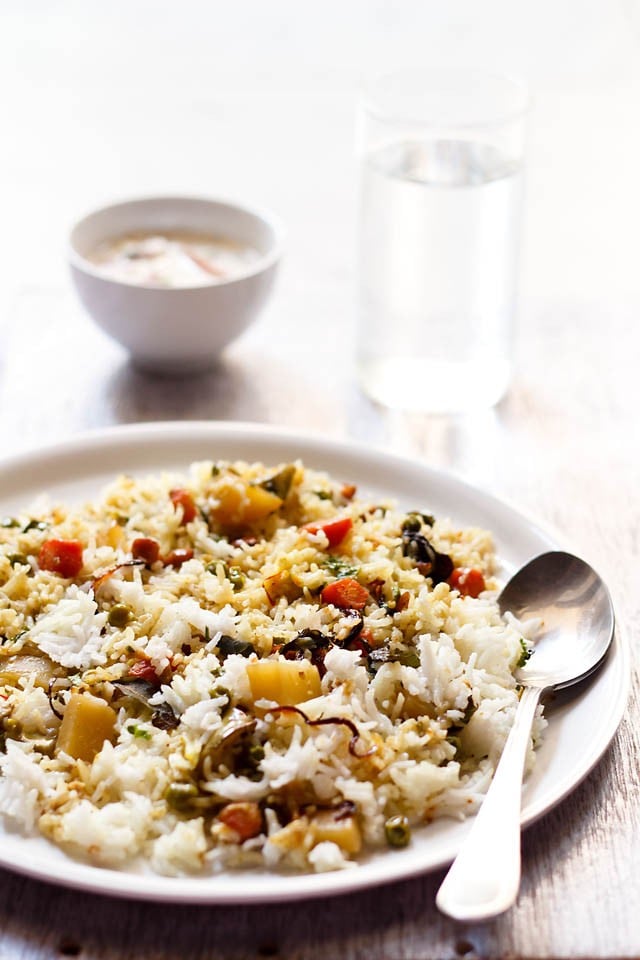
Table of Contents
About Malabar Biryani
My family loves rice-based dishes, and it’s a no-brainer that biryani tops the list. Though, it does take some time and effort to make a beautifully fragrant Malabar Biryani too, the beauty of it is that I don’t have to cook anything else with it. It’s a complete meal in itself. Just a simple salad or raita works great with it.
This Malabar Biryani recipe is adapted from Neeta Dutta’s ‘1000 Great Indian Recipes: The Ultimate Book of Indian Cuisine,’ which is a great cookbook covering Indian cuisine vastly. I must admit that I have tried a few other recipes from the book. But the Kerala Biryani recipe is a favorite.
While other biryanis have a predominant flavor of yogurt in them, this Thalassery Biryani has the principal flavor of coconut milk in which the vegetables are cooked. Overall, this biryani is milder, little sweet in taste and less in heat since it has less spices as compared to the Hyderabadi or Tamil Nadu style biryanis.
The Thalassery Biryani is unique in the sense that it is made with kaima rice also known as jeerakasala rice. These are short grained rice having a lovely aroma and are not sticky.
In Kerala and some parts of Tamil Nadu this particular rice variant is used to make biryani. Even Nei Choru or the Kerala Ghee Rice is made with kaima rice.
Nowadays kaima rice is easily available online. But if still you cannot source it, make the biryani with the easily available basmati rice. Make sure that your basmati rice is aged as it gives the best texture to the biryani.
How to make Malabar Biryani
1. First soak 2 cups kaima rice or basmati rice in 3 cups water for 20 to 30 minutes. Drain all the water.
Cook the rice grains in 6 cups of water until they are ¾ᵗʰ cooked. Using a strainer, drain the remaining starchy water from the rice.
You can opt cook rice in a pan, pressure cooker, microwave or in a rice cooker. To make this Thalassery Biryani either use kaima rice (jeerakasala rice) or basmati rice.
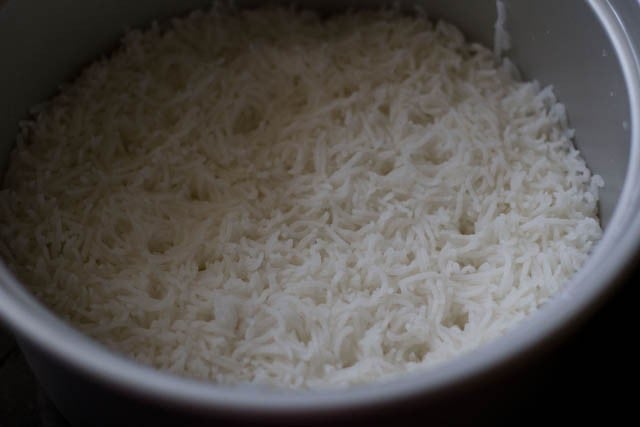
2. While the rice is cooking, you can prep the vegetables and keep them aside. Heat 5 to 6 tablespoons of oil and add 1 cup of sliced onions.
Fry the onions on medium heat until they become light brown. I have used a neutral flavored oil but feel free to use coconut oil or ghee.
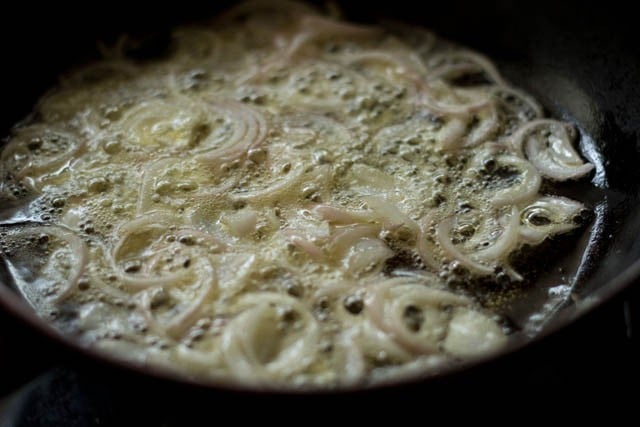
3. Now, add ¼ or ⅓ cup chopped cashews, ¼ cup raisins, 2 sprig curry leaves and fry till the mixture turns golden brown. Make sure you don’t burn the mixture.
Fry on low heat. By the time onions turn golden brown, the cashews, raisins and curry leaves would also have browned. In case you can’t do this way, then fry all of them one by one.
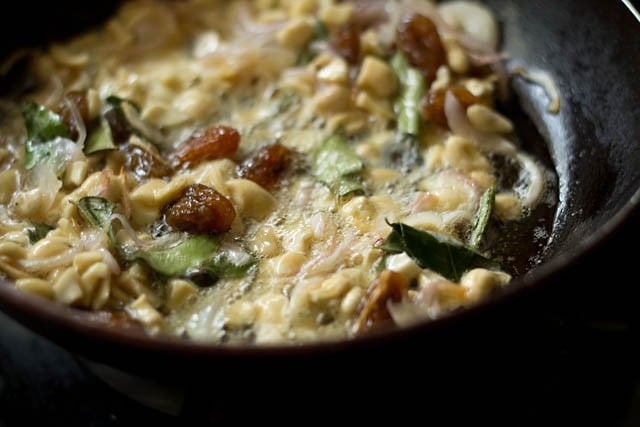
4. Using a slotted spoon remove this fried mixture and set aside on a plate.
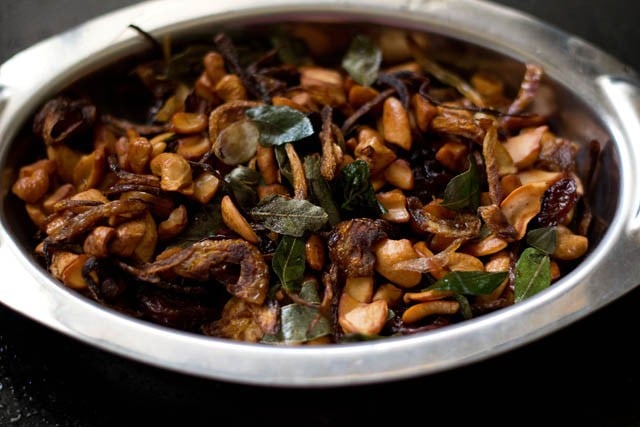
Make Vegetable Gravy
5. Use the same oil in which the onions, etc. are fried. Take about 2 to 3 tablespoons of this oil in another pan or pot and place on the stovetop. Keep heat to a low.
Add the whole spices – 2 inch cinnamon stick, 7 to 8 cloves and 4 to 5 green cardamoms. Fry on low heat till the spices splutter and the oil becomes fragrant.
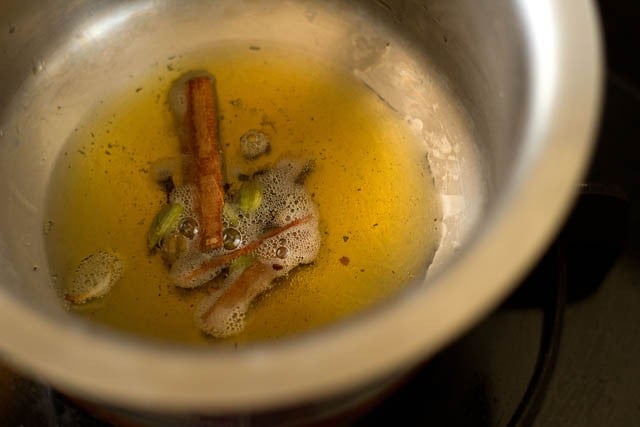
6. Add the remaining sliced onions – ¾ cup. Fry onions until they are lightly golden.
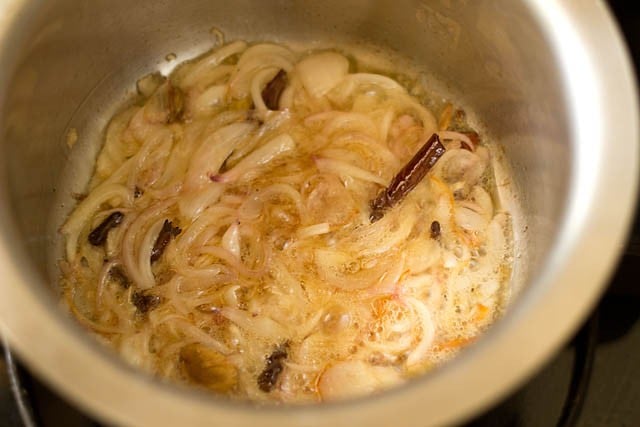
7. Add 1 tablespoon ginger-garlic paste and 2 green chilies (chopped) and sauté for a minute on low heat.
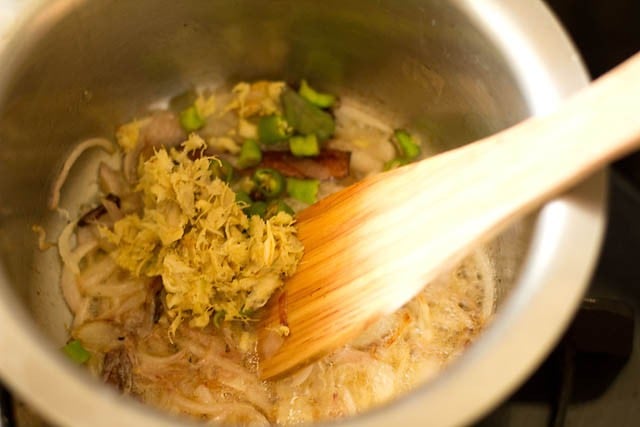
8. Add the dry spice powders listed below:
- 1 teaspoon coriander powder
- 1 teaspoon fennel powder
- ½ teaspoon black pepper powder
- ¼ or ½ teaspoon red chili powder
- ¼ or ½ teaspoon turmeric powder
Sauté for a few seconds on low heat taking care not to burn the spices.
At this step you can also add about ½ cup chopped tomatoes after sautéing the ground spices. Sauté tomatoes until they turn soft and mushy.
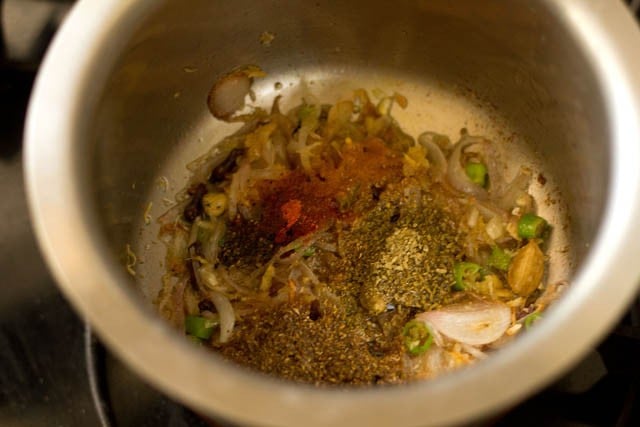
9. Add 2 cups chopped vegetables, ½ cup green peas and stir. Sauté for a minute. I have used small eggplant (brinjal), potato, carrots and peas.
Add veggies like cauliflower, french beans, bell peppers, broccoli, baby corn. You can even add mushrooms and steamed or boiled unripe jackfruit and even soya chunks.
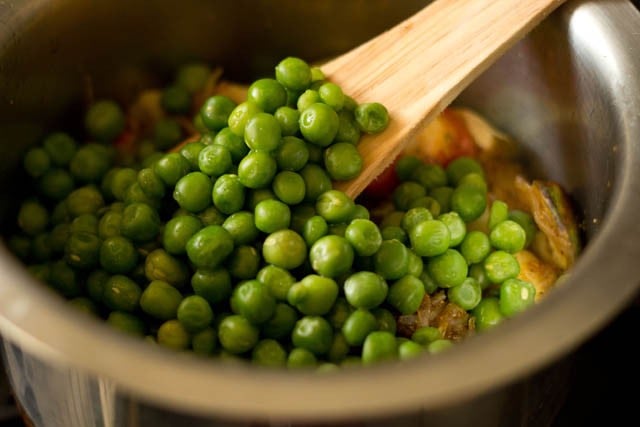
10. Now, add 2 cups of thick coconut milk.
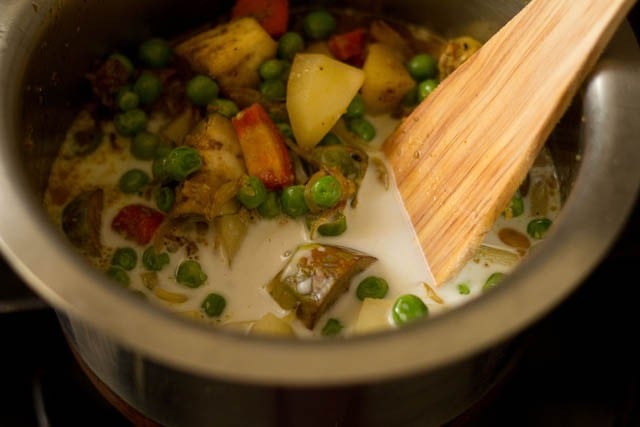
11. Stir to combine on low heat. Add ½ cup water (or as needed) along with ½ or 1 tablespoon lemon juice. Mix again.
Cover the pan with lid and let the vegetables cook on low to medium-low heat. The curry would reduce a bit once the vegetables are tender and cooked.
If you plan to use curd (yogurt) instead of lemon juice, then add at this stage. Mix well and add salt. Add about ¼ cup of beaten yogurt or curd.
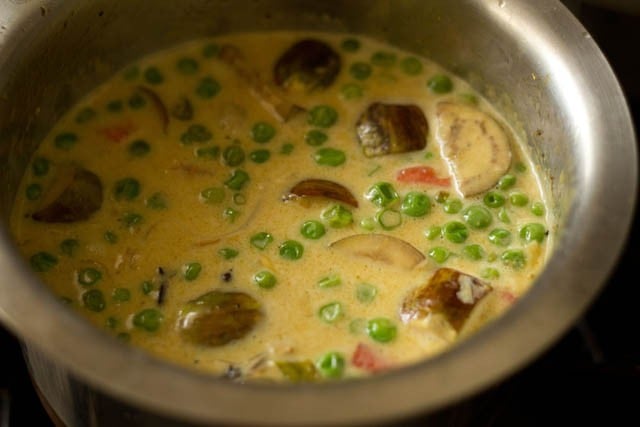
12. Meanwhile top the fried mixture (onions, cashews, raisins and curry leaves) onto the cooked rice.
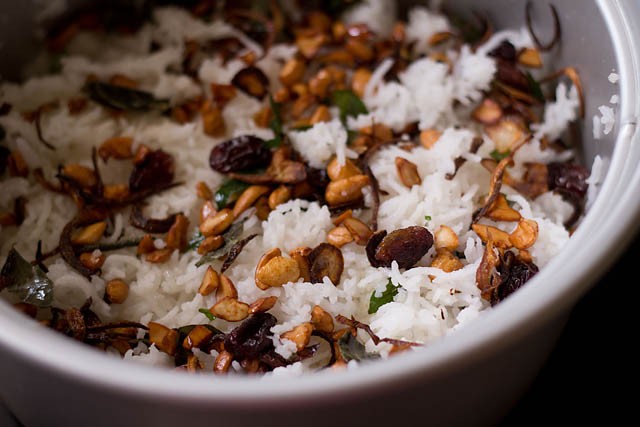
13. Once the vegetables are tender, we can start layering the biryani. The gravy is cooked now.
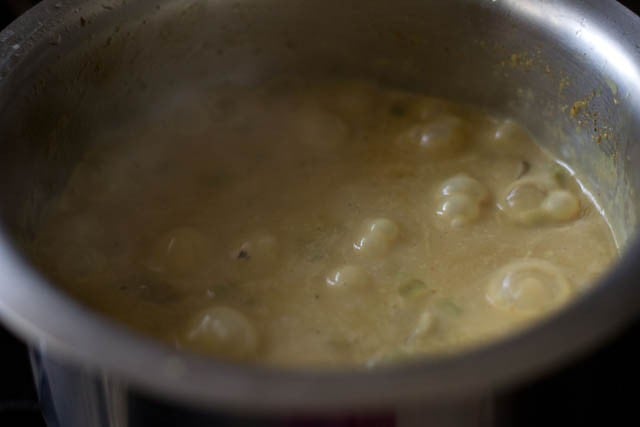
Layer and Make Malabar Biryani
14. Grease an oven proof Pyrex bowl or pan with oil. Layer the vegetable gravy first followed by the rice.
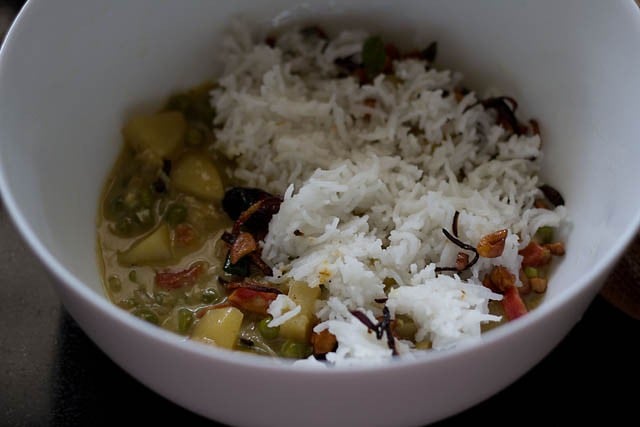
15. Spread ½ tablespoon of chopped mint and ½ tablespoon of chopped coriander leaves on top.
Sprinkle saffron water (12 to 15 saffron strands soaked in 1.5 tablespoon water). Dot with some oil or ghee if you prefer.
Instead of saffron water, you could also use a few drops of natural edible orange or yellow color.
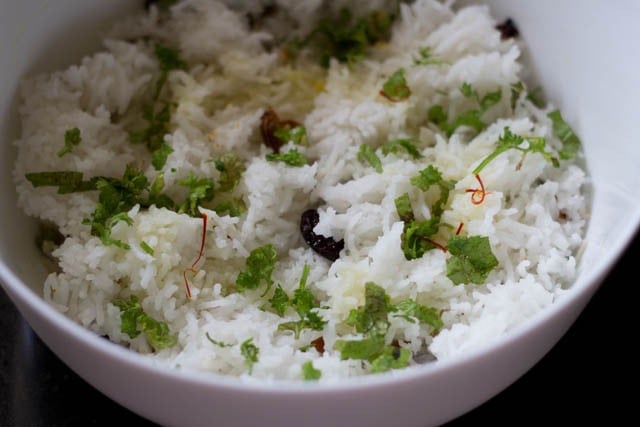
16. Spread another layer of the vegetable gravy. Now spread the fourth layer of rice.
Sprinkle the chopped mint and coriander leaves and saffron water. Dot with some oil again. Cover with an aluminium foil.
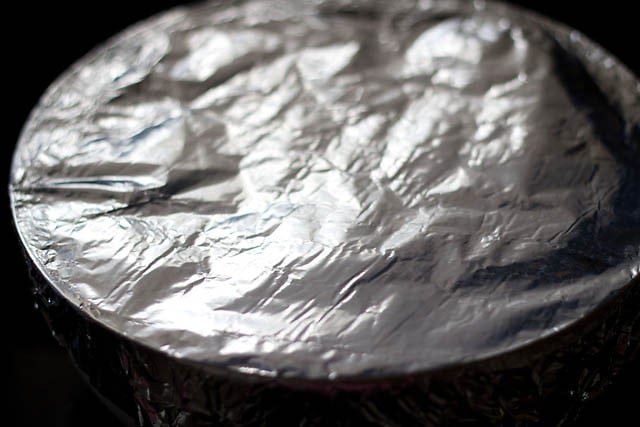
17. Bake the Malabar Biryani in a preheated oven at 200 degrees C for 25 to 30 minutes. The below photo shows biryani after baking.
You could also opt to cook the layered biryani in a tightly covered pan on stove top for 25 to 30 minutes on low heat.
Use a heavy tawa or skillet and heat it first for a few minutes on the stove-top. Place the covered biryani pan/pot on the tawa and then cook the biryani on a low to medium-low heat.
I prefer to bake this biryani rather than dum cooking on stovetop as I don’t have to worry about the base layer getting burnt.
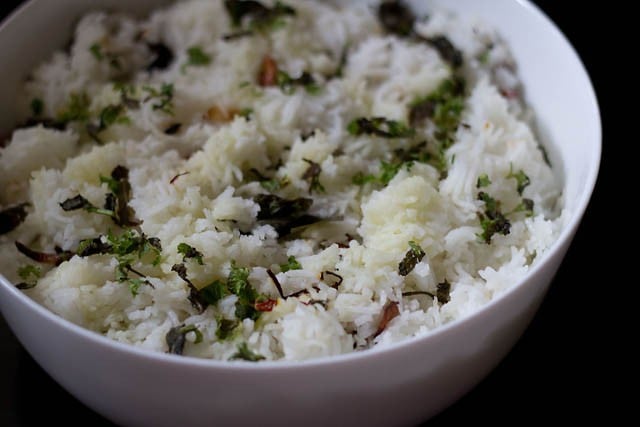
18. Serve the Malabar Biryani hot with a raita or salad. I served with Onion Raita.
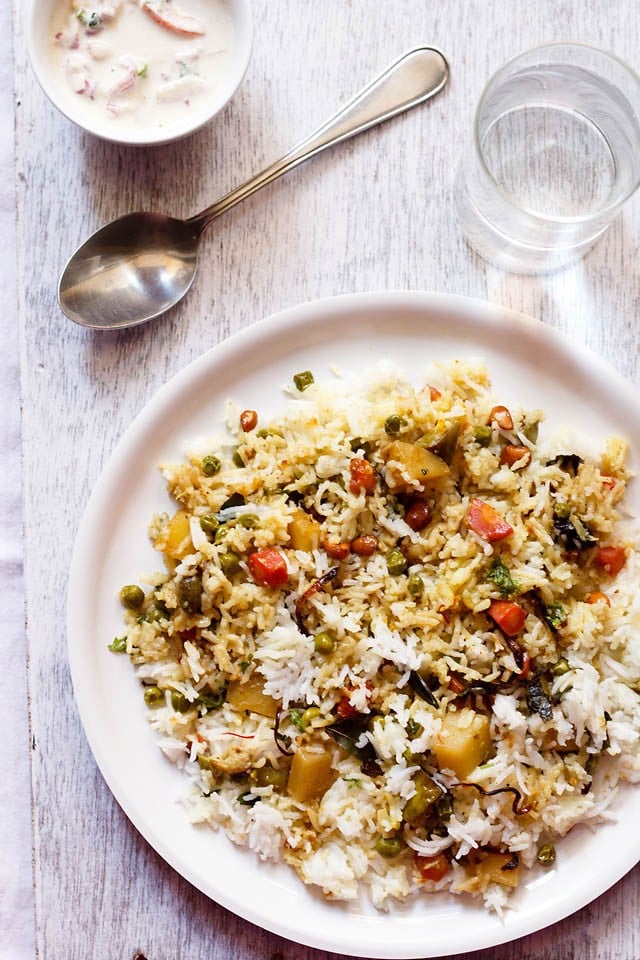
Serving Suggestions
You can serve this Thalassery Biryani with your choice of raita, plain curd (yogurt), salad or kachumber, lemon wedges, papad or pickle. Or have it just as it is.
You can refrigerate the leftover biryani for a day only. While reheating, steam for 5 minutes in a pan or instant pot. Or you can lightly sauté the biryani stirring frequently in a frying pan or skillet until warm or hot.
Vegetarian Biryanis are also a thing
Since I am a vegetarian, I have developed quite a few vegetarian biryani recipes like this Malabar Biryani as well as the Hyderabadi Veg Dum Biryani. Other than the Malabar Biryani recipe with vegetables, other biryanis that are common at my home are the Kathal Biryani, Palak Biryani, Chana Biryani, Bombay Biryani, etc.
I have also created my versions of the famous Lucknowi Biryani, Kolkata Biryani and Mughlai Biryani with veggies. You must check out this Biryani Rice recipe as well to make a simple, flavorful rice that goes great with curries and dal.
A lot of people may argue about how an authentic biryani should only be meat-based. What I feel is if you put your heart, soul and follow the traditional recipes to the T, then making certain changes like substituting the non-vegetarian ingredients with vegetarian ones isn’t a big deal. Eventually, you must get a biryani which is flavor-laden and satisfying. That’s what matters!
Expert Tips
- Rice: To make any biryani, you need good quality rice. Biryani is not mushy and the rice grains should remain separate in the dish. Also, the rice should not be fully cooked and only cooked about 75% or ¾ ᵗʰ. It should have a slight bite and can be cooked in a pan, pressure cooker, microwave or a rice cooker. For this Thalassery Biryani recipe either use the short grained kaima rice or the long grained basmati rice.
- Spices: The lovely aroma comes from using whole spices in this Kerala Biryani recipe. So, make sure that the spices are fresh and in good condition. In case you don’t have saffron, you can also use a pinch of turmeric powder dissolved in water or a yellow edible color.
- Coconut milk: It is best if you can prepare a batch of fresh Coconut Milk at home that can be used in this recipe. In case you can’t, you can also use the store-bought one canned coconut milk.
- Curd (Yogurt): If you’re using curd or yogurt instead of coconut milk in the vegetable gravy of this biryani, then make sure to use fresh curd which is not sour. The curd should also be made from whole milk. Do not use fat free curd made from toned milk as it will split while cooking.
- Biryani gravy: The vegetable gravy of this biryani should have a medium to medium-thick consistency. It should not be watery like a stock or broth, as this will lead to the rice becoming mushy or very soft.
- Cooking biryani: Once layered, the biryani can be baked in a preheated oven or cooked in a tightly covered pan on stove top on a low heat.
More South Indian Biryani Variants
Rice Recipes
Tamil Nadu Food
Rice Recipes
Rice Recipes
Please be sure to rate the recipe in the recipe card or leave a comment below if you have made it. For more vegetarian inspirations, Sign Up for my emails or follow me on Instagram, Youtube, Facebook, Pinterest or Twitter.
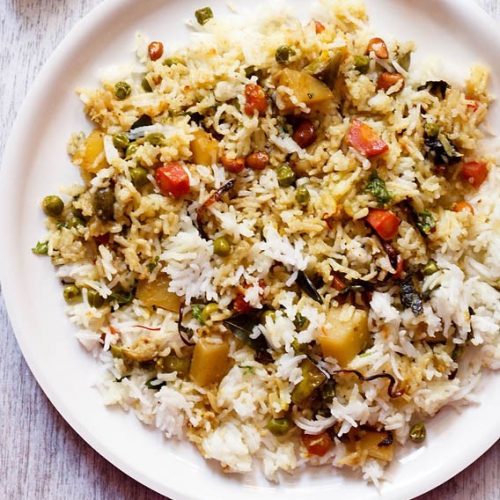
Malabar Biryani | Kerala Thalassery Biryani (Veg)
Ingredients
For the rice
- 2 cups rice – soaked in 3 cups water, kaima rice or basmati rice
- 6 cups water – for cooking rice
- ¼ or ⅓ cup cashews – chopped
- 15 to 20 curry leaves
- ¼ cup raisins
- 1 cup onions – thinly sliced
- 5 to 6 tablespoons oil
- 12 to 15 saffron strands dissolved in 1.5 tablespoon water or yellow edible color or a pinch of turmeric dissolved in water can also be used.
- salt as required
For the vegetable gravy
- 2 cup chopped vegetables – I used small eggplants (brinjal), potato, carrots
- ½ cup green peas – fresh or frozen
- 1.5 cups onions – thinly sliced
- 2 inches cinnamon stick
- 7 to 8 cloves
- 4 to 5 green cardamoms
- 2 cups Coconut Milk – thick or canned thick coconut milk
- 1 tablespoon Ginger Garlic Paste
- 2 green chilies – chopped
- ½ cup water or as needed
- 1 teaspoon coriander powder (ground coriander)
- 1 teaspoon fennel powder (ground fennel)
- ½ teaspoon black pepper powder
- ¼ or ½ teaspoon red chilli powder or cayenne pepper
- ¼ or ½ teaspoon turmeric powder (ground turmeric)
- ½ or 1 tablespoon lemon juice or ¼ cup curd (yogurt)
- 1 tablespoon mint leaves – chopped
- 1 tablespoon coriander leaves (cilantro), chopped
- salt as required
Instructions
Preparation
- First, rinse the rice a few times in water. Soak the rice for 20 to 30 minutes.
- Later cook the rice in water until the rice grains are ¾ᵗʰ cooked. Drain the remaining starchy water and set the rice grains aside.
- Heat oil and add the sliced onions.
- Fry till the onions become light golden.
- Add the cashewnuts, raisins and curry leaves.
- Fry till the mixture turns golden on low heat. Don't burn.
- Remove with a slotted spoon and add the fried onions, cashews, raisins and curry leaves to the cooked rice. Do not mix. Simply make a layer of the fried onions mixture on top of the rice.
Making vegetable gravy
- In another pan, add 2 to 3 tablespoons of this oil in which the onions were fried. You can add more oil if required. Heat the oil on a low flame.You can also opt to use fresh oil or use ghee instead.
- Add the whole spices – cinnamon, cloves and green cardamoms.
- On a low heat fry till the oil becomes fragrant and the spices splutter.
- Now, add the 1.5 cups sliced onions and sauté on medium-low heat until light golden, stirring often.
- Add the ginger-garlic paste and green chilies. Sauté for a minute on low heat.
- Add the dry ground spice powders and sauté for a few seconds.
- Add the mixed chopped vegetables. Sauté for a minute.
- Add the coconut milk. Stir and then add water along with lemon juice.
- If using yogurt instead of lemon juice, then add at this step. Stir well.
- Add ½ cup of water. Cover the pan and let the vegetables cook on low to medium-low heat. The gravy will reduce a bit.
- Once the vegetables are tender and cooked, we can start layering the biryani.
Layering and making Malabar Biryani
- Grease an oven proof bowl or pan with oil.
- Layer the vegetable gravy first. Then layer the rice.
- Spread the chopped mint and coriander leaves on top.
- Sprinkle the saffron water. Dot with some oil.
- Spread another layer of the vegetable gravy.
- Now spread the fourth layer of rice.
- Sprinkle the chopped mint, coriander leaves and saffron water.
- Dot with some oil again. Cover and seal tightly with an aluminium foil.
- Bake Kerala Biryani in a preheated oven at 200 degrees Celsius for 25 to 30 minutes.
- You can also cook the layered biryani in a tightly covered pan on stove top for 25 to 30 minutes on low heat.
- Serve Malabar Biryani hot or warm with raita or kachumber.
Notes
- Add vegetables of your choice. You can even make this Malabar Biryani with button mushrooms, steamed or cooked unripe jackfruit or soya chunks.
- Instead of oil, you can use ghee or coconut oil.
- Use thick coconut milk. Homemade is better but you can also use canned thick coconut milk.
Nutrition Info (Approximate Values)
This Malabar Biryani recipe post from the blog archives first published on April 2013 has been updated and republished on December 2022.
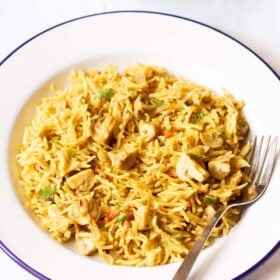
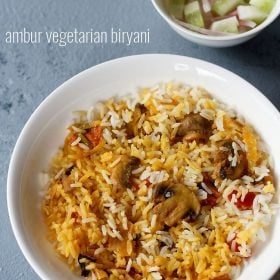
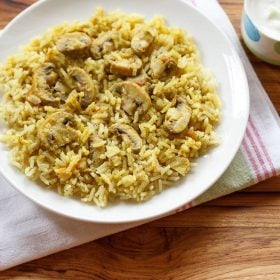
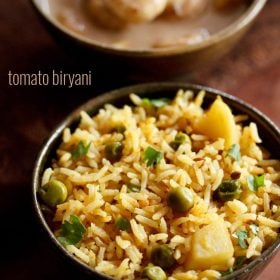
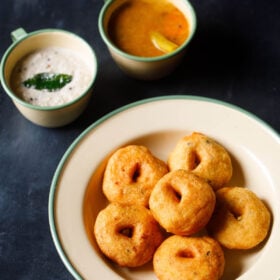
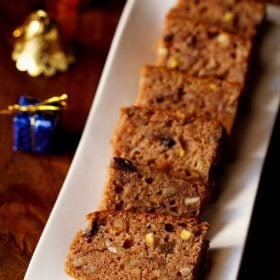
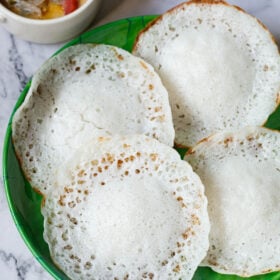
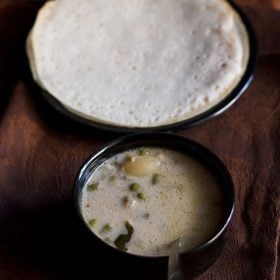








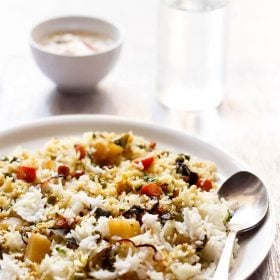
Beautiful and delicious recipies
So tasty
thanks for positive feedback 🙂
Hi,
This was a very delicious recipe. Just a quick note. The step by step method with pictures shows the dry ingredients being added, but the printable version has left that out. I ended up dry roasting and adding the spices to the gravy while it was cooking. I was attempting it for the first time and tripling the recipe so did not think about it till it was too late. Will definitely try it again.
thaks pearly. you have a sweet name 🙂 i have made the change in the printable version. thanks for letting me know. even if you dry roast the spice powders then too its fine. so what you did was right 🙂
I need recipe of a rich type of baryani, if you can , I shall really shall appreciate you.
sajjad basit.
there are quite a number of biryanis posted and some of them are rich too. you can use the google search button on top and type the word ‘biryani’. you will get all the recipes.
very good ………,
Hi Dassana, I made this biryani today. It was so yummy that I still can’t stop licking my fingers ! 🙂 Thanks for this wonderful recipe. Regarding baking this oven, do you generally keep both elements on when baking any dum style biryani or only one element?
Once again, thanks for this biryani recipe. It is sooo good and I hope all your viewers make this biryani and experience the same happiness that I did ! 🙂
welcome radhika. glad to read your positive comment. i keep both the heating elements on.
Hi,
I made this today for my daughter’s bday. We are yet to taste it but by seeing it itself I know that this would be the most delicious biriyani I ever made. Also I never take effort for layering but this time i did so seeing your beautiful and delicious pics. Thank you.
thanks ami. i hope you all enjoyed the biryani.
I like Indian food and this recipe sounds very inviting, hope it is not very spicy or hot
victoria, it is one of the mild biryani as compared to other south indian biryani recipes. on a second note, indian food is on spicer side for many non-indians. so you can reduce the spices little bit, if you like.
I love briyani foods. Will try your recipe. Thanks a lot!
Looks awesome Dassana
This looks so tempting. I am soooo trying this! 🙂